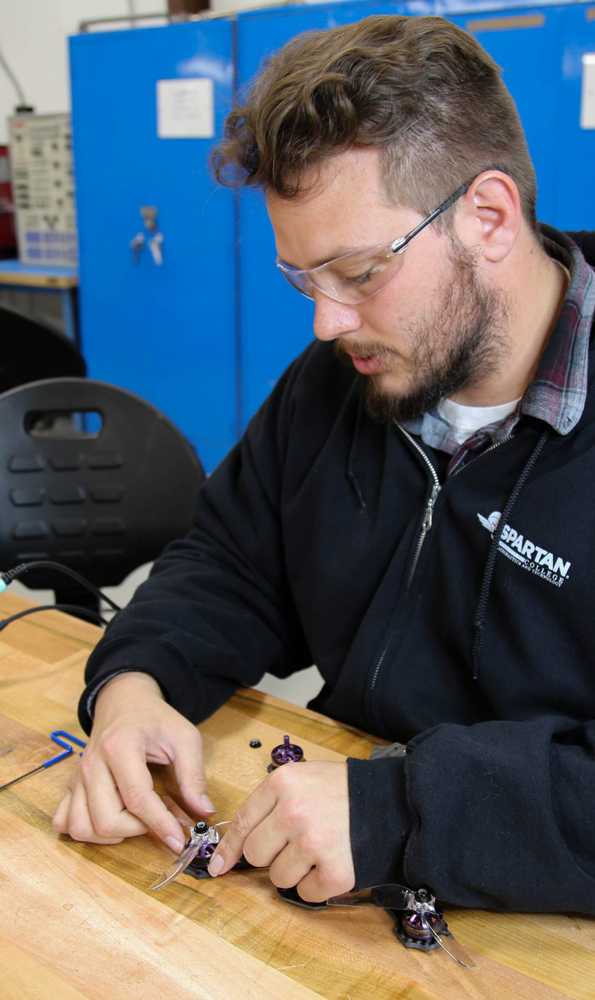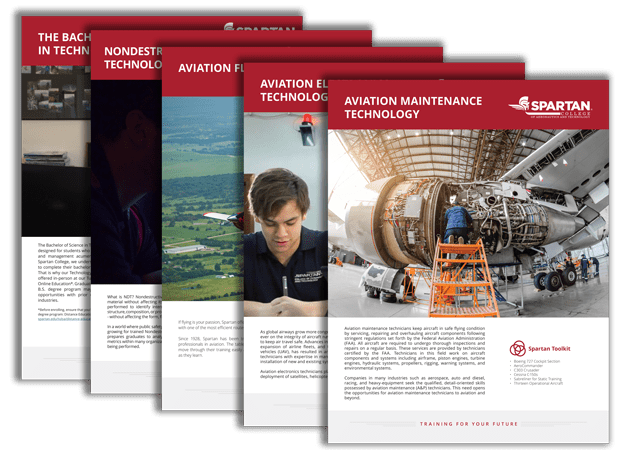Aviation Electronics Technology In Tulsa Area

Training the Next Generation of Aviation Electronics Technicians
Spartan’s Aviation Electronics Technology (AET) program (also known as Avionics) has been training Electronics Systems Technicians for decades. Our students train to use industry-related technology to test the reliability and operational status of Avionics Systems. In addition, students build their own electronic trainer, FM receiver, and more; including assembling and programming their own Drone (UAV).
Interested in Learning More?
Program Details

Aviation Electronics Technology
Diploma · Program Length: 12 months (Not Currently Enrolling)
Associate of Applied Science Degree · Program Length: 15 months
Our programs are designed to teach students entry-level technical skills in electronics that are applicable in aviation as well as other industries. Students learn to read and use aircraft maintenance manuals and how to read and interpret aircraft commercial drawings and electronics schematics. They study FAA regulations, learn the proper use of basic tools and test equipment, study electronic theory, and have hands-on training in the installation, troubleshooting and repair of electronic and avionics systems.
In addition, associate degree students will focus on interpersonal skills such as oral and written communication, customer service and diversity in the workplace.
A Day in the Life of a Student
- Build and troubleshoot aerospace electronics
- Programming and flying drones
- Assembling and testing radar systems
- Developing and maintaining circuit boards and microwave devices
- Utilizing high reliability soldering and building wiring harnesses to integrate systems
- Building, testing and installation of various instrument panels
- Learn about encrypted electronics communications
Certification Disclosure Information - FCC
Certification Disclosure Information - FAA

PREPARE FOR TAKEOFF BY GETTING A LAY OF THE LAND
Course Work
Part of the Demand for Airline Technicians
according to the Boeing Pilot Technician Outlook 2021 – 2040.
*Boeing: Pilot and Technician Outlook, http://www.boeing.com/commercial/market/pilot-technician-outlook/
WHAT EQUIPMENT DOES OUR SCHOOL HAVE TO OFFER?
GARMIN G1000 FLAT SCREEN AVIONICS DISPLAYS
GARMIN G1000 FLAT SCREEN AVIONICS DISPLAYS
NAVIGATION SYSTEMS
NAVIGATION SYSTEMS
AUTOPILOT SYSTEMS
AUTOPILOT SYSTEMS
RADAR EQUIPMENT
RADAR EQUIPMENT
AIR TRAFFIC CONTROL TRANSPONDERS
AIR TRAFFIC CONTROL TRANSPONDERS
Sample Classes
Spartan College classes use electronic trainers and instruments from Snap-On, BK Precision, Lab-Volt, Tektronix, Garmin, Michel, and Linaire among others. Spartan College is focused on teaching students the fundamentals of avionics to prepare them for an entry level career. Much like other courses at Spartan College, aviation electronics provide a balance between the lab and lecture.
This course focuses on basic transistor theory and applies it to amplifiers, amplifier classes, amplifier configurations, operational amplifiers, and oscillators. Students learn transistor theory and transistor types, including BJT, FET, UJT, and IGBT, as well as decibel conversions, gain calculations, and amplifier construction.
This course is a study of aviation navigation systems and their instrumentation. The nav systems studied include VOR, GPS, Localizer, Glide Slope, Marker Beacon, and Gyros. Channeling methods and aviation-specific data busses are also introduced. This course also goes into various analog instruments and how different systems are displayed on the flight deck.
In this Associate level course, students will learn many of the aspects of Unmanned Aerial Systems (UAS), including classes, size, capabilities/limitations and different technologies, and different Robotic technologies as well as the FAA regulations associated with UAS’s.
FAQ's
Simply provide evidence you have graduated high school or equivalent, like the General Education Development (GED) test. You’ll also need your high school transcript or an official copy of the military DD214 may be used as an official proof of high school graduation only if the document includes a specific graduation date.)
For a full list of prerequisites, check out our College Catalog for our Tulsa programs.
There is no difference between the two terms, other than one is the shorter, catchier nickname for the profession and program. Avionics helps keep your conversation going without taking time on the mouthful that is Aviation Electronics Technology.
We keep it formal for our programs because it’s the correct thing to do for higher education institutions.
Graduates of Spartan’s AET program can be found in a variety of jobs, some of our graduates have gone on to work as:
- Avionics Technician
- Bench Technicians
- Biomedical Technician
- Aircraft Test technician
- Airframe Technician
- Assembly & Tester
- Avionics Installation Technician
- Environmental and Functional Test Technician
- Field Avionics Technician
- Test Technician – Radio Frequency
Get the most up-to-date information about all our programs, we regularly update our Catalog Supplement guide. It’ll give you the full scoop on all tuition, fees, and any associated costs of training at Spartan. Get in touch with an Admissions rep.
Here is a small sampling of courses you will encounter on your avionics journey:
- Amplifiers and Power Control Devices
- Industrial Controls and Robotics
- Aerospace Soldering and Inspection
- Aerospace Wiring
- Avionics Communication Systems
- Navigation and Instrumentation
- Radar and Pulse Systems
- Unmanned Aerial Systems and Robotics
A day in the life of a typical AET student involves building and troubleshooting aerospace electronics, programming and flying drones, assembling and testing radar systems, using high reliability soldering and building wiring harnesses to integrate systems, and so much more. There’s hardly a dull day.
Yes, all of our programs involve general education courses. When earning your associate’s degree, you’ll be required to take a few more general education classes than you would when earning your diploma.
All Spartan classes are on a set schedule. However, most students find our class times convenient to their busy lifestyles. If you’re looking for specifics, check out our College Catalog.
Absolutely. About half of your time as a student will be spent in class and the other in hands-on lab environment.
No.
We’re so glad you asked. See the aviation pioneers who have come before you on our Spartan Alumni and our Tulsa testimonials pages.
You probably have a lot of questions about college. If you don’t find the answers you need on these pages, just call 918-831-8688 to speak with an admissions representative.